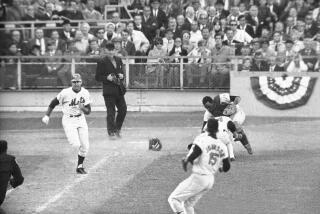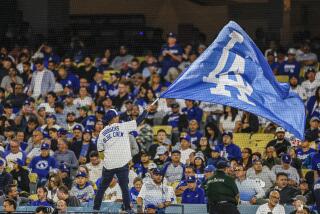No Realignment; Baseball Will Try Unbalancing Act
- Share via
Major league baseball owners, concerned that economic problems may force some franchises to be relocated or even revoked, put off realignment Friday until 2002 or later, but approved adoption of an unbalanced schedule for next year.
Playing an unbalanced schedule, teams play more games against division rivals.
“We still need to realign,” Commissioner Bud Selig said from New York, “but the critical part was getting back to an unbalanced schedule after 24 years. I’m very pleased about that.”
So are others.
“I think it’s good for baseball, it’s great for baseball,” Dodger Manager Davey Johnson said. “When you’re deciding who the best in your division is, the best way to decide is to play in your division. We had that for many years in baseball and it worked, and I’m happy we’ll have it again.”
The American League went to a balanced schedule in 1977, the National League in 1993. Depending on the size of the division, teams will play 16 to 19 games against division rivals, rather than the 12 or 13 currently.
The best of the geographic pairings--Dodgers-Angels, for instance--will be retained during interleague play, but the divisions will also rotate for the first time so that it will not strictly be West against West, etc.
As for realignment, Selig said he had the votes to get it passed but “came to the conclusion about a month ago that, given the various franchise and economic problems, it would be better to wait and see what happens. We want the next realignment to be long-term. We don’t want to have to redo it.”
With Montreal, Minnesota, Oakland, Tampa Bay and Florida all troubled franchises, the possibility of a contraction from 30 teams to 28, or the relocation of one or more franchises tabled a plan that would have created four National League divisions of four teams each and three American League divisions, with four teams in the West and East and six in the Central.
The Texas Rangers would have moved from the AL West to the AL Central, the Arizona Diamondbacks would have moved from the NL West to the AL West, and the Tampa Bay Devil Rays would have moved from the AL East to a new Southeast division in the National League. The Diamondbacks strongly opposed the move but had no veto under terms of their expansion entry.
Jerry Colangelo, Arizona’s managing general partner, laughed Friday and said, “Someone said to me today, ‘Welcome back to the National League.’ I didn’t know we had left.”
*
Times staff writer Jason Reid contributed to this story.
More to Read
Go beyond the scoreboard
Get the latest on L.A.'s teams in the daily Sports Report newsletter.
You may occasionally receive promotional content from the Los Angeles Times.










